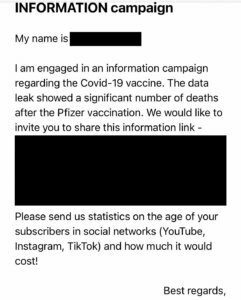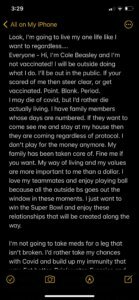On May 18, German social media influencer Mirko Drotschmann was sitting on his couch when a strange email popped into his inbox.
It was from an advertising company called Fazze, offering him compensation to disparage U.S. COVID-19 vaccines.
“They wanted me to tell my subscribers that there are many deaths connected to the Pfizer vaccine. And they offered me money for that.”
Offered the opportunity to name his own price, he got suspicious: “All the information they sent me was wrong.”

More than 600,000 Americans have died from COVID-19, and more than 42 million have been infected with the coronavirus. And still, millions of people from all walks of life have refused to get vaccinated.
According to the CDC, more than 386 million doses of COVID-19 vaccines were administered in the United States from Dec. 14, 2020, through Sept. 20, 2021.
During that time, the CDC’s Vaccine Adverse Event Reporting System received 7,899 reports of death (0.0020%) among people who received a COVID-19 vaccine.
But that does not mean the vaccine caused all, or any, of those deaths. The FDA requires health care providers to report any death after COVID-19 vaccination to VAERS, even if it’s unclear whether the vaccine was the cause.
After going to Fazze’s website, Drotschmann’s suspicion grew.
“It was kind of strange. The website said it was located in the U.K., but I found out that the CEO lives in Moscow, and many employees lived in Moscow.”
It was also strange, Drotschmann said, that “I couldn’t find a physical building for that company. When I did some research, I found out that this agency had a connection to a bigger agency in Russia, called ADNow.”
The most unusual element about this company, for Drotschmann, was that he could find no evidence of any ad campaigns that they’d done in the past.
He decided to expose them, but first he launched his own ruse.
Drotschmann said, “I told the guy who sent me the first email that I was interested and I needed more information. I asked him if there were any other influencers in Germany that were a part of the campaign. He said, ‘No, not at the moment.’ I asked who pays for all this? He said ‘That is a secret’.”
When Drotschmann asked for more information about how to present the campaign, they sent him a link to a website.

“I was told that I should say that all this was my own research — that I found this info about this vaccination,” Drotschmann said. “They [also] wanted me to keep it secret that I would get money for it and keep it secret that it was a sponsored post.”
So on May 21, he blew the whistle.
“I took a screenshot and after that I posted it on Twitter. One week later when it came out the same thing happened to some colleagues in France, it was a huge thing.”
In addition to media requests from around the world, the German government also contacted him. “We had a meeting,” he said. “It was a secret, so I can’t say anything about it.”
Vaccine disinformation
The U.S. has been a target of Russian intelligence disinformation operations for decades, dating back to the 1960s, when dropping flyers was their principal method of communication. But late last year, the State Department released a report exposing the Kremlin’s use of evolving digital technology to amplify divisions among Americans.
And COVID-19 is a popular theme: Dozens of social media platforms are exploited to inundate millions of Americans, often without their knowledge, with anti-vaccine messaging.
The report said Russia sees three advantages to this approach: It allows for the same false narratives to be introduced in numerous variations; it provides plausible deniability for the Kremlin, and “it creates a media multiplier effect among the different pillars of the ecosystem that boost their reach and resonance.”
‘It could effectively persuade’
On Aug. 4, Samantha Williams, who lives in the D.C. area, got a text message from a relative who lives in Prince George’s County, Maryland.
It contained an image of a flyer.

“I was shocked how well presented and articulated the information on the flyer appeared,” Williams said.
This well-crafted flyer was a big problem. “The information on the flyer was technically true but I thought it inflated the risk of the vaccine,” Williams said.
The messaging on the flyer, Williams said, “was compelling, and I thought it could effectively persuade any Black person that was not inclined to get the COVID-19 vaccine and [could] perhaps question vaccination in general.”
It’s not clear whether there is any direct connection between that flyer and the information Fazze and ADnow used to recruit influencers, but there are basic similarities: Both focused on amplifying negative developments related to the vaccines or outright lies.
The flyer, according to Williams, was written in such a way that elements of truth are injected in statements that include information that is false.
“Whenever you mix a little truth with a lie, the lie takes on a life of its own,” said Williams.
In Fazze’s case, the lies caught up to them: After Drotcshmann and a French influencer exposed the disinformation campaign, Facebook realized there was a connection to its platform and took action:
We removed 65 Facebook accounts and 243 Instagram accounts from Russia that we linked to Fazze, a subsidiary of a UK-registered marketing firm, whose operations were primarily conducted from Russia. Fazze is now banned from our platform. This operation targeted audiences primarily in India, Latin America and, to a much lesser extent, the United States. We found this network after reviewing public reporting about an off-platform portion of this activity.
During the course of multiple investigations, intelligence and police authorities noted similarities between the Fazze disinformation campaign and the Russian government’s Sputnik V Twitter feed.
A Russian intelligence operation exposed
The use of a social media campaign with roots in a third country to reach Americans has clearly hit its target.
“I’ve never seen the Soviet Union or Russia this effective in their covert action campaigns,” said former CIA covert operative Robert Baer.
Baer and many other intelligence experts and officials believe this campaign was designed to do three things: divide Americans, physically harm or kill Americans and promote Russia’s own vaccine.
“Portraying COVID-19 as a hoax ends up sending more Americans to the hospital, and it divides Americans politically,” said Baer.
Retired FBI Special Agent Tom O’Connor agrees: “Russia — first off, their game is sowing polarization in the United States. Divide and conquer is their thing. It always has been. That’s how they operate.”
O’Connor said something else is at stake — vaccine supremacy.
“They have their own vaccine, which they believe is the best and by sowing disinformation about the U.S.-based vaccines, they are trying to make people less secure with those and more secure with theirs,” O’Connor said.
There are questions about how deeply involved Russian intelligence agents are in promoting disinformation campaigns on U.S. soil. Much of their work can be done remotely, but Baer believes they are here in the U.S.
“There are Russian agents working on U.S. soil carrying out these campaigns,” Baer said.
So where exactly are these agents stationed?
“The main front for the FSB station is the so-called Russian Center of Science and Culture” in D.C., said former KGB officer Yurii Shvets, now a U.S. citizen.
Responding to the problem
Whether it’s due to a Russia-based online campaign or activity on the ground in the U.S. by Russian agents or others, influential people across the U.S. appear to have bought into disinformation about COVID-19 vaccines. And it significantly complicates the work health care officials are faced with.

“It’s time-consuming and exhausting, because the multiplying effect of disinformation in social media is so profound,” said Dr. Anthony Fauci, director of the National Institute of Allergy and Infectious Diseases.
The impact of disinformation has spread to large, highly visible organizations around the country — such as the NFL.
Numerous players have made public statements flatly refusing to be vaccinated or suggesting as much, based on concerns about how the vaccines would impact them.
Buffalo Bills receiver Cole Beasley indicated he would rather accept forced retirement than be vaccinated.
And he believes the NFL’s position regarding unvaccinated players is unfair.
“Once unvaxxed players get cut, they’re losing a dream they’ve worked their whole lives for, over a vaccine that is proven to not keep people from contracting COVID, as we’ve seen,” Beasley said.
Minnesota Vikings Quarterback Kirk Cousins was removed as a spokesperson at a hospital in his hometown of Holland, Michigan, after he allegedly demonstrated no desire to be vaccinated:
While we acknowledge that each person is entitled to their own viewpoints, those who speak on our behalf must support messages that align with the hospital’s position on matters of vital importance to individual and community health. For this reason, Holland Hospital will discontinue using Kirk Cousins as our spokesperson for now.
The NFL Players Association has fought back hard against disinformation, even while fighting for players’ rights decide whether to get vaccinated.

“We’ve dealt with it by really having a zero-sum focus on what’s true, what’s scientifically validated and what can be objectively verified,” said DeMaurice Smith, executive director of the NFL Players Association.
That includes “sometimes calling out just how wrong, incorrect and false some of the allegations are,” Smith said.
Smith said the response of NFL players is a microcosm of the country.
“For the people who truly want to find out the truth, the people who want to engage in an understanding about what’s real and what’s not, what’s true and what’s false, talking with our membership about these issues has been really, really positive,” he said.
But for other players, when it comes to the truth about COVID-19 vaccines, “they’ve chose to [rebut] it or ignore it.”
Vaccination acceptance appears to be improving in the U.S. but, security experts warn disinformation campaigns will continue to turn up on social media, attempting to amplify themes that could divide and possibly cause harm to Americans.
O’Connor said: “Defeating conspiracy theories is not an easy thing, but it is something that needs to be done, because I’ve never seen it at the level it is now.”








